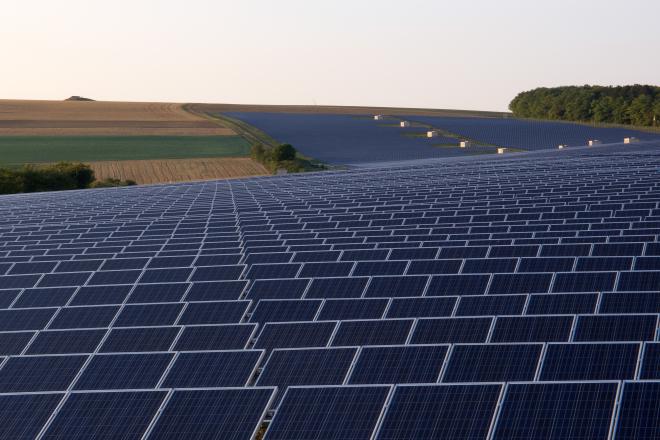Commercial Solar Electric Systems

Credit: Solarvoltaic System by OhWeh is licensed under CC BY-SA 2.5
Resource Description
AE 868 examines the theories and design practices of solar electric systems in the context of utility and commercial-scale applications. An important goal of the course is to equip solar professionals with skills to follow the impact of hardware trends in industry on feasibility, design, and the commissioning of such systems. Students will learn how to design solar electric systems as well as the processes required for permitting, construction, and commissioning. Topics include conceptual design of solar electric systems, solar electric technologies, inverter and power management technologies, design theory and economic analysis tools, system design processes for grid-tied and off-grid systems, integration of energy storage and demand response systems, construction project management, permitting, safety and commissioning, system monitoring, and maintenance. Learn moreEnergy Markets, Policy, and Regulation

Credit: Calculator by stevepb is licensed under CC0
Resource Description
EME 801 provides a broad introduction to global markets for crude oil and refined petroleum products, natural gas, and electric power. A major goal of the course is to help students understand how market design, market institutions, and regulatory structures affect firm-level decision-making in the energy industries and ultimately, how these decisions affect the functioning of energy markets and the prospects for alternative technologies. Students also learn the fundamentals of project finance and how to manage risks associated with policy changes, as well as risks associated with changes to the national, local, and global energy markets. Learn moreFrom Meteorology to Mitigation: Understanding Global Warming

Credit: Blue Icebergs Under Cloudy Sky by Pixabay is licensed under CC0
Resource Description
Human-caused climate change represents one of the great environmental challenges of our time. As it is inextricably linked with issues of energy policy, a familiarity with the fundamentals of climate change is critical for those looking to careers in the energy field. To appreciate the societal, environmental, and economic implications of policies governing greenhouse gas emissions, one must understand the basic underlying science. METEO 469 serves to lay down the fundamental scientific principles behind climate change and global warming. A firm grounding in the science is then used as a launching point for exploring issues involving climate change impacts and mitigation. Learn moreGlobal Energy Enterprise

Credit: Lobbying 161689 by OpenClipart-Vectors is licensed under CC0
Resource Description
Have you seen a Clean Coal baseball cap? In the challenge to meet soaring energy demand with limited resources, volatile issues like those related to the environment, national security and public health are often addressed outside of normal market transactions and are called externalities, or nonmarket factors. Stakeholders can act in resourceful ways to create a nonmarket environment that best serves their interest. A firm may challenge a law that makes it expensive or difficult to do business or compete with others, for example. An individual may organize a boycott of products or services that violate the individual's interests or principles--hey, don't buy from them! Nonmarket strategy in the energy sector is the subject of this engaging course. Learn moreHuman Use of the Environment

Credit: Green 2558976 by StockSnap is licensed under CC0
Resource Description
Geography 430 is an active, creative learning community focused around understanding the changing relationships between people and their environments, the causes and consequences of environmental degradation, strategies for building a more sustainable world, and the methods and approaches that scholars have used to understand human-environment interactions. The primary course objectives are to help geographers, earth scientists, and other professionals to deepen their appreciation for the complexity of human-environment systems and to develop skills that allow them to interpret, analyze, and communicate effectively regarding human-environment interactions in their lives as students, professionals, and citizens. Learn moreUtility Solar Electric and Concentration

Credit: Blue Solar Panels by Carl Attard is free to use
